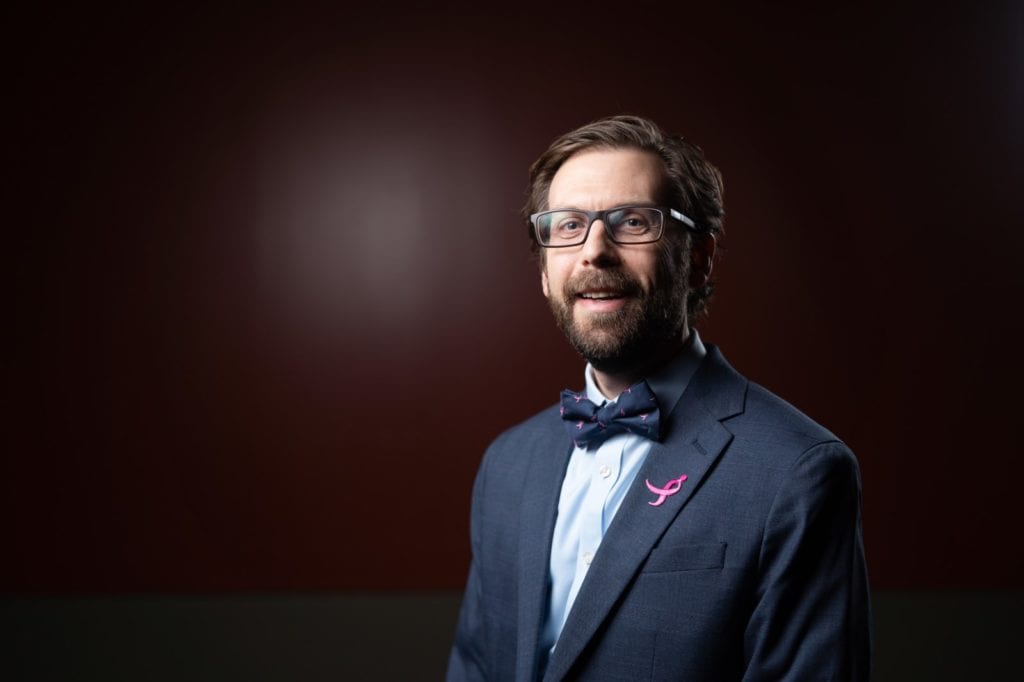
Daniel Stover, M.D., tells Susan G. Komen that his work in the lab has influenced how he cares for his breast cancer patients. His research focus on emerging technologies, such as liquid biopsies and leveraging Big Data, are helping him to think holistically about patient care and improving patients’ quality of life.
Stover, a Komen Career Catalyst Research grantee, is a medical oncologist and computational biologist at The Ohio State University Comprehensive Cancer Center.
Helpful definitions:
Liquid biopsy: a blood test the looks for cancer cells or pieces of DNA from cancer cells that are circulating in the blood.
Big Data: the integration of different types of data including electronic health records, administrative and health insurance claims databases, large data repositories, and “-omics” information.
Komen: What drew you to a career in breast cancer?
Stover: The opportunity to have long-term relationships with my patients. I really believe the partnership between an oncologist and their patient is critical, not just to a patient’s comfort but to providing the best care. I think that partnership can play out in a lot of important ways, like helping patients get comfortable enough to ask questions that might be tough or discuss issues that might be not the easiest to talk about. Among breast cancer patients, I think it’s a special opportunity to build this partnership over time, which is one of the things I love most about my job.
Komen: You treat breast cancer patients in the clinic, but a lot of your work is focused on research. What are you learning in the lab that has influenced your clinic work?
Stover: When I first received funding from Susan G. Komen, I had been out of research for about five years doing my clinical training, my medical training. I then had the opportunity to really devote myself to getting back into basic research. The funding allowed me to do that, and over those three years, I changed my career trajectory from one focused on treating patients, which I still do part of the time, to one where I primarily focus on breast cancer research, which is what I do today.
Having individuals who can both treat patients and do research is an important part of the ‘total ecosystem for breast cancer’ because we can understand what’s going on from the patient perspective but also have a significant presence in research.
Komen: What kind of research are your focused on now?
Stover: I started out as a cell biologist, where I spent my time looking at cells in mouse models. But I saw the wave of Big Data being used as a tool in cancer research and cancer care. This was a gap in my existing expertise, and I wanted to be able to apply Big Data to both patients and my research. I changed my research direction from my Komen Postdoctoral Fellowship grant, which was a very basic cell biology project, to a Komen Career Catalyst Research grant, which is focused on Big Data, liquid biopsy and genomics.
Komen: What strides do you think we can make in breast cancer by leveraging Big Data?
Stover: Big Data in breast cancer is a broad term. We can think about big clinical data, hundreds or thousands, or tens of thousands, of patients who might provide access to their clinical data. But I think Big Data approaches have the opportunity to influence all facets of breast cancer care and research. From cancer care delivery, clinical trials, to translational research and basic research. Supporting Big Data and breast cancer researchers who have the capacity to deal with complex data is only going to help us as we go forward.
Komen: Can you tell us about the impact that liquid biopsies can have on breast cancer care?
Stover: Technology development, like liquid biopsies, is really how we’re going to move the needle, both in terms of treating our patients, but also in understanding their disease. One of the big benefits of liquid biopsies, is that in some cases, patients can avoid a tissue biopsy or maybe avoid as many tissue biopsies. For many patients, tissue biopsies can be associated with anxiety, they can be painful and there are some risks. Sometimes tissue isn’t even accessible based on where a patient might have breast cancer. So liquid biopsies offer an opportunity to understand what’s going on with the tumor, potentially by avoiding tissue biopsies in some cases. From a patient-centered perspective, that adds to quality of life.



